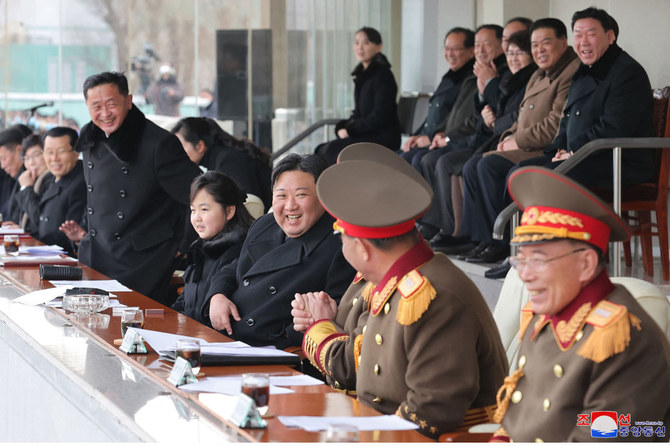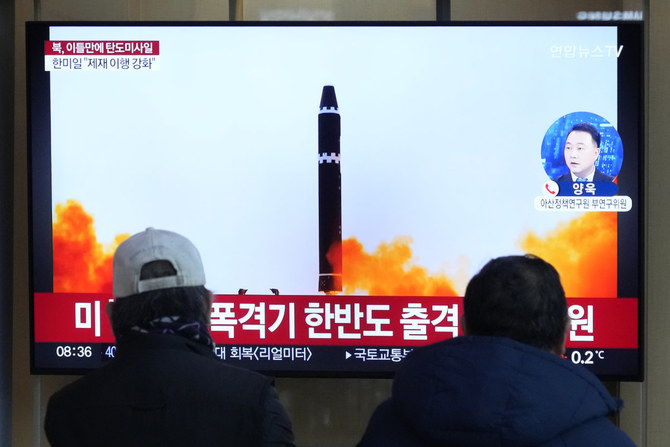SEOUL: North Korea fired two more ballistic missiles off its east coast on Monday, ignoring a call by UN Secretary-General Antonio Guterres on Pyongyang to cease “provocative actions.”
The powerful sister of leader Kim Jong Un also warned US forces to halt military drills, saying the reclusive nuclear state could turn the Pacific into a “firing range.”
In a statement spokesman issued Sunday, UN Spokesman Stephane Dujarric said Guterres reiterated a call for Pyongyang “to immediately desist from taking any further provocative actions.”
“The Secretary-General strongly condemns the launch of yet another ballistic missile of intercontinental range by the Democratic People’s Republic of Korea,” referring to North Korea’s official name.
In a counter-move against its rogue neighbor, South Korea imposed new sanctions on four individuals and five entities linked to Pyongyang’s weapons programs.
The launches come just two days after North Korea fired an ICBM into the sea off Japan’s west coast, prompting the United States to hold joint air exercises with South Korea and separately with Japan on Sunday.
North Korea’s state media confirmed it fired two projectiles from a multiple rocket launcher, aiming at targets 395 km (245 miles) and 337 km (209 miles) away, respectively.
“The 600mm multiple rocket launcher mobilized in the firing... is a means of tactical nuclear weapon,” capable of “paralyzing” an enemy airfield, state news agency KCNA said.
Japan’s Defense Ministry said the two ballistic missiles, fired around 2200 GMT, reached a maximum altitude of about 100 km and 50 km, traveling a distance of about 350-400 km before falling outside Japan’s EEZ.
There were no reports of damage to aircraft or vessels.
In a statement, the ministry said it would continue to gather and analyze information in close cooperation with the United States.
“North Korea’s series of actions, including its repeated ballistic missile launches, threaten the peace and security of Japan, the region, and the international community,” the ministry said. “Japan lodged a strong protest and forcefully condemned North Korea.”
Tensions rising
North Korean leader Kim’s sister, Kim Yo Jong, warned against increased presence of US strategic assets on the Korean peninsula after the United States held the joint air drills with its Asian allies over the weekend.
“We are carefully examining the influence it would exert on the security of our state,” she said in a statement. “The frequency of using the Pacific as our firing range depends upon the US forces’ action character.”
Kim Yo Jong also challenged experts’ assessment of its missile capabilities after some pointed out that it took over nine hours for the “sudden” missile launch to take place following an order from leader Kim, and said South Korea didn’t even fly reconnaissance planes at the time of its launch.
“We have possessed satisfactory technology and capability and, now will focus on increasing the quantity of their force,” she said. “We affirm once again that there is no change in our will to make the worst maniacs escalating the tensions pay the price for their action.”
Analysts say tensions in the region are expected to further heighten as South Korea and the United States plan a range of expanded field exercises, including live fire drills, in the coming weeks and months.
The two countries are also set to hold simulated nuclear drills, called the Deterence Strategy Committee Tabletop Exercise, at the Pentagon on Wednesday.
Park Won-gon, a professor at Ewha Womans University in Seoul, said Monday’s missile launch and statement are in line with the North Korean foreign ministry’s recent threat to take “unprecedentedly persistent, strong” responses to the allies’ joint military drills.
“North Korea seems to be trying to stoke tension in the region and reinforce its nuclear capability by raising issue over the drills, and the statement by Kim Yo Jong signals there would be additional provocations,” Park said.
Monday’s missile launch is the North’s third major weapons test this year after it fired an unprecedented number of missiles last year, including ICBMs capable of striking anywhere in the United States.





























